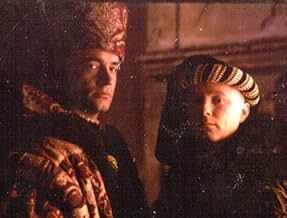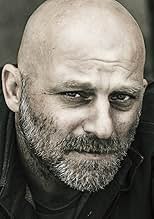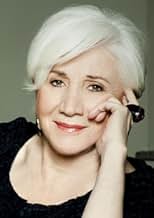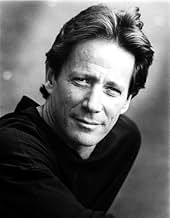IMDb RATING
6.6/10
6.6K
YOUR RATING
Spurred by divine voices and visions, fifteenth century teen Joan d'Arc leads French forces against the English.Spurred by divine voices and visions, fifteenth century teen Joan d'Arc leads French forces against the English.Spurred by divine voices and visions, fifteenth century teen Joan d'Arc leads French forces against the English.
- Won 1 Primetime Emmy
- 15 wins & 29 nominations total
Browse episodes
6.66.5K
1
2
3
4
5
6
7
8
9
10
Featured reviews
Wonderful rendition
I had to write a comment after reading the previous one. I found this to be a very refreshingly straightforward rendition of the Joan of Arc story that taught me, as one who only knows the story from movies, a great deal about the political and social realities at the time, including the hunger for real leadership and real spiritual authority. Not too different from our own times now.
Apparently a great deal of research was done, including a thorough reading of the transcripts of Joan's actual trial in the original French, to get both the setting and Joan's personality right. And I think it shows. It certainly held my interest, and nothing about its budget distracted me.
Plus they did not make her a complete victim - she knew enough to go willingly to the stake. And that's a courageous move on the part of the film's creators which adds that final necessary element of spiritual integrity. Enough so I willingly cried many times through it without feeling manipulated... these matters of soul and spirit felt real to me, and for a skeptical Scorpio like me that's high praise for work well done.
Apparently a great deal of research was done, including a thorough reading of the transcripts of Joan's actual trial in the original French, to get both the setting and Joan's personality right. And I think it shows. It certainly held my interest, and nothing about its budget distracted me.
Plus they did not make her a complete victim - she knew enough to go willingly to the stake. And that's a courageous move on the part of the film's creators which adds that final necessary element of spiritual integrity. Enough so I willingly cried many times through it without feeling manipulated... these matters of soul and spirit felt real to me, and for a skeptical Scorpio like me that's high praise for work well done.
15th Century France Goes to War Inspired By a Teenage Girl??
Yes. It wouldn't happen today, that's for sure, but it really did happen once upon a time in France, some 580 years ago. A nation managed to unite against an occupying power, inspired and led by a girl who responded to the request of her mysterious "voices" to do something about it when she was about seventeen years of age. Growing up in Domremy in what was then Lorraine, this girl clearly ended up quite the tomboy, typically dressed in jerkin, doublet and hose, her hair cropped short, ready upon instruction from her voices to don armour and wield the sword if necessary to raise France like a phoenix from the ashes. The film doesn't show this, but in Domremy she was called "Jeanette," when she arrived in France she was called "Joan," and in the actual transcripts of her trial she states, "as for my surname, I know of none," unlike the title of this film which borrows the popular English version of the name by which she is known today.
The story of Joan makes for a daring plot, and were it not for the fact that the transcripts of Joan's trial still indeed exist today -- making her one of the best known persons in history -- and attest to the events described as being most certain in fact, we might otherwise think such a story line to be quite incredible, if not simply ridiculous.
So let's make no mistake about it: Leelee Sobieski had the nerve to play one of the most riveting characters in history, a risky role that many a great actor has already played with determined success. Yet, like the powerful personage she portrays, Ms. Sobieski achieves a major victory in the final scheme of things. Not that Peter O'Toole didn't turn in his usual stunning performance, or that Ms. Sobieski wasn't also well-supported by Neil Patrick Harris, Maury Chaykin, Maximilian Schell, Shirley MacLaine, Chad Willet, and all under the fine direction of Christian Duguay, but let's face it -- it really boils down to being pretty much a one-kid show.
For a change, Hollywood really did this one right. Joan was a teenager, Joan should obviously be played by a teenager, and Leelee Sobieski was clearly the right kid for the job. Ms. Sobieski captured Joan's many contradictions brilliantly. With Joan, pious spirituality took its place along with a frisky charm, a sense of things serious and urgent often relaxed to humor and a sharp wit, the relentless pain of arrows that pierced her body was surely dulled by her thriving desire to live and her unfailing commitment to lead France to its place in a free world that she herself would sadly never see. Leelee Sobieski wove all of these into the highly textured character of Joan, not leaving a single aspect untouched, even though Joan's personality could occasionally disturb those of us who are far less saintly. Ms. Sobieski captured the spirit of a teenaged girl who actually led France to war in the 15th Century, and managed to create a crystalline character that convincingly showed us how that just might happen.
This film borrows freely from history but, to its credit, it thankfully doesn't borrow much of anything from the many previous films about Joan. Leelee Sobieski goes beyond being the best "Joan" in film so far. She so superbly plays the role that one could rightly say that she is the only Joan so far. For this reason alone, don't miss this film.
We don't know much about what Joan looked like, as no portraits or detailed descriptions of her were made from anyone who actually saw her during her short life. We don't know if Leelee Sobieski physically resembles the historical Joan or not and, since it seems we'll never know, it also doesn't matter. Joan was in her teens at her finest hour, Leelee is a teenager, and that's close enough. Furthermore, there are so many interesting facts pertaining to Joan's life, her character, her family, her friends, her enemies, the logistics of the battles, and so forth and so on, that a film would need to go on for hours to even begin to capture most of it, so I think it's quite fair to forgive the film's several omissions. If viewers are inspired to know more about Joan (and after seeing this film they certainly should be), then I'd recommend perusing Regine Pernoud's book entitled, "Joan of Arc by Herself and Her Witnesses," (Scarborough House; Lanham, Maryland; 1994), still considered by many to be the best written work on the subject.
One final and perplexing thought: the mini-series "Joan of Arc" is but one of several films on this character that are being produced within the span of only a couple of years. It almost seems as though Joan (after several hundreds of years have gone by) has somehow caught our imagination as we approach the end of the millenium. Perhaps in our uncertain times when heros seem to be in short supply, we somehow hope that the spirit of a young teenage girl from 15th Century France will guide us and lead us to freedom as we enter upon a new age in history. At any rate, aside from mere coincidence, I just don't know quite how else to explain this phenomenon.
The story of Joan makes for a daring plot, and were it not for the fact that the transcripts of Joan's trial still indeed exist today -- making her one of the best known persons in history -- and attest to the events described as being most certain in fact, we might otherwise think such a story line to be quite incredible, if not simply ridiculous.
So let's make no mistake about it: Leelee Sobieski had the nerve to play one of the most riveting characters in history, a risky role that many a great actor has already played with determined success. Yet, like the powerful personage she portrays, Ms. Sobieski achieves a major victory in the final scheme of things. Not that Peter O'Toole didn't turn in his usual stunning performance, or that Ms. Sobieski wasn't also well-supported by Neil Patrick Harris, Maury Chaykin, Maximilian Schell, Shirley MacLaine, Chad Willet, and all under the fine direction of Christian Duguay, but let's face it -- it really boils down to being pretty much a one-kid show.
For a change, Hollywood really did this one right. Joan was a teenager, Joan should obviously be played by a teenager, and Leelee Sobieski was clearly the right kid for the job. Ms. Sobieski captured Joan's many contradictions brilliantly. With Joan, pious spirituality took its place along with a frisky charm, a sense of things serious and urgent often relaxed to humor and a sharp wit, the relentless pain of arrows that pierced her body was surely dulled by her thriving desire to live and her unfailing commitment to lead France to its place in a free world that she herself would sadly never see. Leelee Sobieski wove all of these into the highly textured character of Joan, not leaving a single aspect untouched, even though Joan's personality could occasionally disturb those of us who are far less saintly. Ms. Sobieski captured the spirit of a teenaged girl who actually led France to war in the 15th Century, and managed to create a crystalline character that convincingly showed us how that just might happen.
This film borrows freely from history but, to its credit, it thankfully doesn't borrow much of anything from the many previous films about Joan. Leelee Sobieski goes beyond being the best "Joan" in film so far. She so superbly plays the role that one could rightly say that she is the only Joan so far. For this reason alone, don't miss this film.
We don't know much about what Joan looked like, as no portraits or detailed descriptions of her were made from anyone who actually saw her during her short life. We don't know if Leelee Sobieski physically resembles the historical Joan or not and, since it seems we'll never know, it also doesn't matter. Joan was in her teens at her finest hour, Leelee is a teenager, and that's close enough. Furthermore, there are so many interesting facts pertaining to Joan's life, her character, her family, her friends, her enemies, the logistics of the battles, and so forth and so on, that a film would need to go on for hours to even begin to capture most of it, so I think it's quite fair to forgive the film's several omissions. If viewers are inspired to know more about Joan (and after seeing this film they certainly should be), then I'd recommend perusing Regine Pernoud's book entitled, "Joan of Arc by Herself and Her Witnesses," (Scarborough House; Lanham, Maryland; 1994), still considered by many to be the best written work on the subject.
One final and perplexing thought: the mini-series "Joan of Arc" is but one of several films on this character that are being produced within the span of only a couple of years. It almost seems as though Joan (after several hundreds of years have gone by) has somehow caught our imagination as we approach the end of the millenium. Perhaps in our uncertain times when heros seem to be in short supply, we somehow hope that the spirit of a young teenage girl from 15th Century France will guide us and lead us to freedom as we enter upon a new age in history. At any rate, aside from mere coincidence, I just don't know quite how else to explain this phenomenon.
Magnificent and spectacular historic television film based on Joan of Arc's life
The movie is set in ¨Hundred years' war¨ developed between 1337 and 1453 (downfall date of Constantinople invaded by Turks). The historical deeds are the following ones : Henry V vanquishes Charles VI in Agincourt (1415) that was a major English victory against a numerically superior French army in the Hundred Years' War . The battle occurred on Friday , 25 October 1415 and Henry V takes over Normandy . Charles VI of France signs ¨Troyes treatise¨ in which Henry V is wedded Charles's daughter . Later on , Henry VI of England proclaims himself king of France but then Joan of Arc , being nineteen years old , proclaims in Bourges to Charles VII as king , after being crowned in Reims . Joan of Arc acting as a divine mission defeats the English army in Orleans . But she's captured by the Borgoneses and is handed over the English authorities and they fire her for heretic and witch in Rouen .
Runtime movie is overlong , approx. three hours , but is neither boring , nor dull , but entertaining . The battle scenarios are very well designed , there are thousands of extras and the struggles are breathtaking . The ending trial in which she's condemned is very interesting and the sentence at the burning pole is overwhelming . Lelee Sobieski , who was only sixteen when shooting , gives a good interpretation , likeness to Neal Patrick Harris as Charles VII . Furthermore , Peter O'Toole as the cunning Bishop is excellent . The support cast is satisfying : Jacqueline Bisset (the mother) , Powers Boothe (the father) , Olimpia Dukakis (the nun) and Peter Strauss (the captain). The motion picture was well directed by Christian Duguay , an expert filmmaker of TV movies . The yarn will appeal to historic event buffs . Rating : 7/10 . Worth viewing the TV picture .
Other films about this historic character are the following ones : Joan of Arc (1999) by Luc Besson with Milla Jovovich , Tchéky Karyo as Dunois , John Malkovich as Charles VII and Toby Jones ; Saint Joan (1957) by Otto Preminger with Jean Seberg , Richard Widmark , Richard Todd and John Gielgud ; The trial of Joan of Arc (1962) by Robert Bresson with Florence Delay ; Joan of Arc (1954) by Roberto Rosselini with Ingrid Bergman ; Joan of Arc by Victor Fleming (1948) with Ingrid Berman , J Carrol Naish , War Bond and Jose Ferrer as Charles VII . Furthermore , silent adaptation such as the classical La passion de Jeanne d'Arc (1928) by Carl Theodor Dreyer with Maria Falconetti and Joan The woman (1916) by Cecil B Demille
Runtime movie is overlong , approx. three hours , but is neither boring , nor dull , but entertaining . The battle scenarios are very well designed , there are thousands of extras and the struggles are breathtaking . The ending trial in which she's condemned is very interesting and the sentence at the burning pole is overwhelming . Lelee Sobieski , who was only sixteen when shooting , gives a good interpretation , likeness to Neal Patrick Harris as Charles VII . Furthermore , Peter O'Toole as the cunning Bishop is excellent . The support cast is satisfying : Jacqueline Bisset (the mother) , Powers Boothe (the father) , Olimpia Dukakis (the nun) and Peter Strauss (the captain). The motion picture was well directed by Christian Duguay , an expert filmmaker of TV movies . The yarn will appeal to historic event buffs . Rating : 7/10 . Worth viewing the TV picture .
Other films about this historic character are the following ones : Joan of Arc (1999) by Luc Besson with Milla Jovovich , Tchéky Karyo as Dunois , John Malkovich as Charles VII and Toby Jones ; Saint Joan (1957) by Otto Preminger with Jean Seberg , Richard Widmark , Richard Todd and John Gielgud ; The trial of Joan of Arc (1962) by Robert Bresson with Florence Delay ; Joan of Arc (1954) by Roberto Rosselini with Ingrid Bergman ; Joan of Arc by Victor Fleming (1948) with Ingrid Berman , J Carrol Naish , War Bond and Jose Ferrer as Charles VII . Furthermore , silent adaptation such as the classical La passion de Jeanne d'Arc (1928) by Carl Theodor Dreyer with Maria Falconetti and Joan The woman (1916) by Cecil B Demille
A challenging role
Joan is perhaps the most female difficult role to cast. The actress must be attractive but not conventionally alluring; magnetic but not intellectual; a towering figure but physically slight. You must understand why people would die for her. Above all, the performer must convey an authentic sense of religious piety, a virtual impossibility for young actors today. Sandrine Bonnaire--a wonderful star in every other respect--tried her hand in the recent French version but was too sexy for the part.
As Joan, Sobieski juggles the disparate requirements astonishingly well. This is emphatically not the kind of movie in which the actress can merely show up and look decorative; you have to work at it, but as Sobieski revealed in Uprising, she has the capacity for challenging period roles. And that also means that in contrast to her female peers in the business, she has a long professional future.
Watch out for O'Toole in an astonishing performance as a Cardinal who gradually realizes that Joan is the real thing.
The culminating scene--no details provided, you must see it yourself--is curiously uplifting and properly theological rather than merely unpleasant.
As Joan, Sobieski juggles the disparate requirements astonishingly well. This is emphatically not the kind of movie in which the actress can merely show up and look decorative; you have to work at it, but as Sobieski revealed in Uprising, she has the capacity for challenging period roles. And that also means that in contrast to her female peers in the business, she has a long professional future.
Watch out for O'Toole in an astonishing performance as a Cardinal who gradually realizes that Joan is the real thing.
The culminating scene--no details provided, you must see it yourself--is curiously uplifting and properly theological rather than merely unpleasant.
Great depiction of the story of Maid of Orleans!
A lot of films have been made about this person, but none of them seems to be as powerful as this one. The reason is not only the fact that few films of such topics include such a great cast (most of the characters are played by great stars of cinema). It is, I think, the way that Mr Duguay portrayed Joan of Arc, really as she most probably was like: a young, sweet maiden who dared say the British: "I will lead my nation to victory through God's help!" She turns out to be a saint rather than, like in some other movies, a religious fanatic.
The portrayal of Joan is created perfectly by a young, beautiful actress, with Polish ancestry, Leelee Sobieski. Throughout the movie, she beautifully stresses her innocence and gentleness going in pairs with the capability of leadership. In my opinion, no matter if Leelee will appear in other 50 films in her life career, this role will always be UNFORGETTABLE!
Others who shine in their roles are, of course, Peter O'Toole as bishop Cauchon. On the one hand, he judges Joan and accuses her of pride and vanity; but on the other hand, fights for her "eternal soul". Maximilian Schell also gives a fine performance as a cruel and double faced representative of inquisition. But I particularly like Peter Strauss as La Hire, a commander of the French army. This role is typical for him: someone hesitating and doubting, but in the long run, opening his eyes and totally setting his heart on the values.
"I stopped to believe in others and started to believe myself only. At Orleans, I stopped to believe myself, I started to believe in you," as he says once to Joan - REALLY POWERFUL!
The mini series about Joan of Arc is a must in my film gallery. Without hesitation, I give it 9/10. GREAT STORY, WONDERFUL CAST, EXCELLENT MUSIC, MEMORABLE QUOTES, GREAT LOCATIONS (old castles in the Czech Republic)! This movie is really visually stunning. Do see it! Having seen once, you will feel a need to see this at least for the second time.
The portrayal of Joan is created perfectly by a young, beautiful actress, with Polish ancestry, Leelee Sobieski. Throughout the movie, she beautifully stresses her innocence and gentleness going in pairs with the capability of leadership. In my opinion, no matter if Leelee will appear in other 50 films in her life career, this role will always be UNFORGETTABLE!
Others who shine in their roles are, of course, Peter O'Toole as bishop Cauchon. On the one hand, he judges Joan and accuses her of pride and vanity; but on the other hand, fights for her "eternal soul". Maximilian Schell also gives a fine performance as a cruel and double faced representative of inquisition. But I particularly like Peter Strauss as La Hire, a commander of the French army. This role is typical for him: someone hesitating and doubting, but in the long run, opening his eyes and totally setting his heart on the values.
"I stopped to believe in others and started to believe myself only. At Orleans, I stopped to believe myself, I started to believe in you," as he says once to Joan - REALLY POWERFUL!
The mini series about Joan of Arc is a must in my film gallery. Without hesitation, I give it 9/10. GREAT STORY, WONDERFUL CAST, EXCELLENT MUSIC, MEMORABLE QUOTES, GREAT LOCATIONS (old castles in the Czech Republic)! This movie is really visually stunning. Do see it! Having seen once, you will feel a need to see this at least for the second time.
Did you know
- TriviaJoan of Arc was left-handed.
- GoofsAfter examining plague victims, Joan uses flaming alcohol to sterilize her hands. However, the existence of micro-organisms and their connection to disease was not known at that time - in fact, hand-washing did not become common medical practice until 500 years later.
- Quotes
Bishop Cauchon: Poor, deluded Joan. She has no idea she has put a monster on the throne. Those are my last words as Your Majesty's spiritual advisor.
- Alternate versionsThe DVD (180 minutes) is the complete miniseries, as it contains 40 minutes cut from the VHS, which is 140 minutes.
- ConnectionsFeatured in The 51st Annual Primetime Emmy Awards (1999)
- SoundtracksPanis Angelicus
Written by César Franck
Arranged by Julian Smith
Performed by Charlotte Church
Courtesy of Sony Music Entertainment (UK) Ltd.
- How many seasons does Joan of Arc have?Powered by Alexa
Details
Contribute to this page
Suggest an edit or add missing content












































